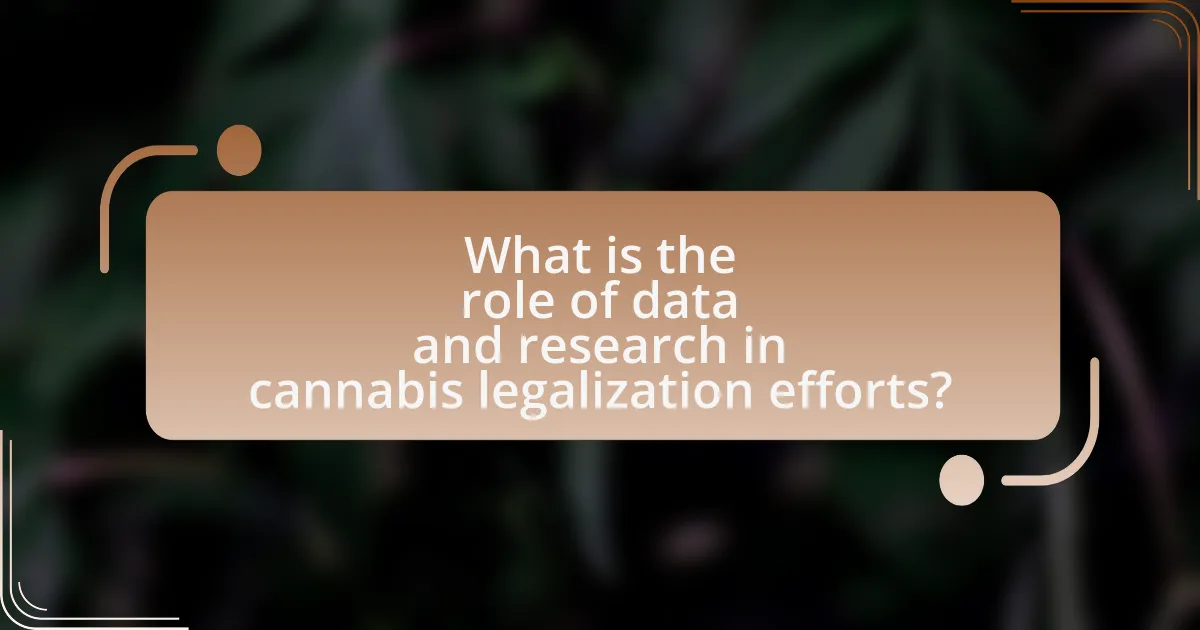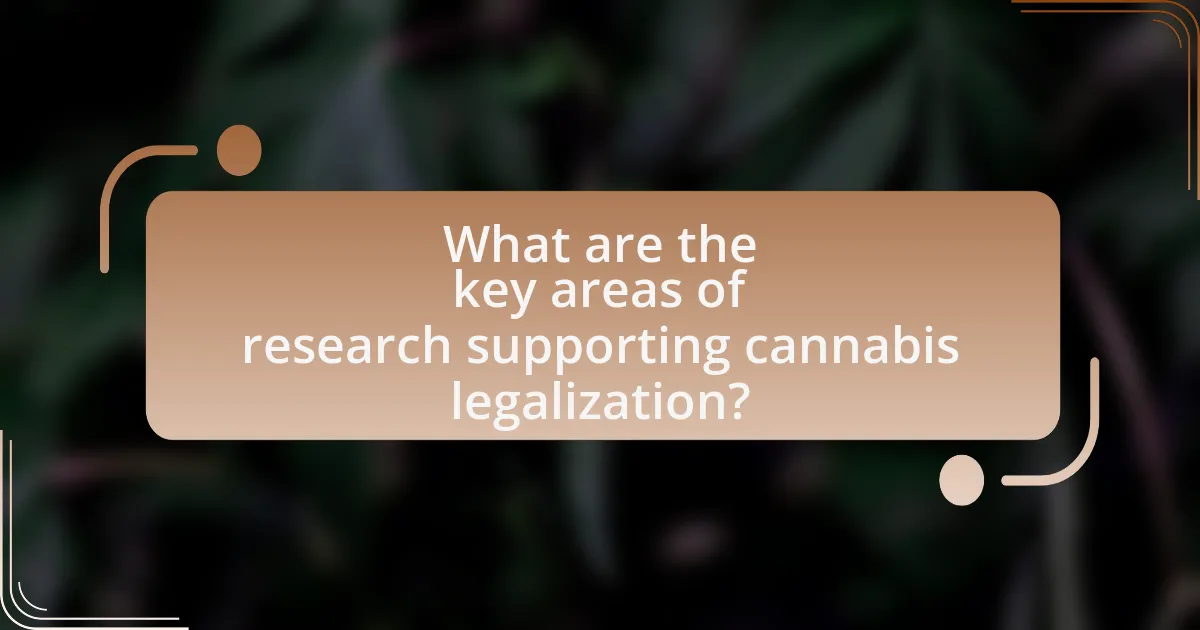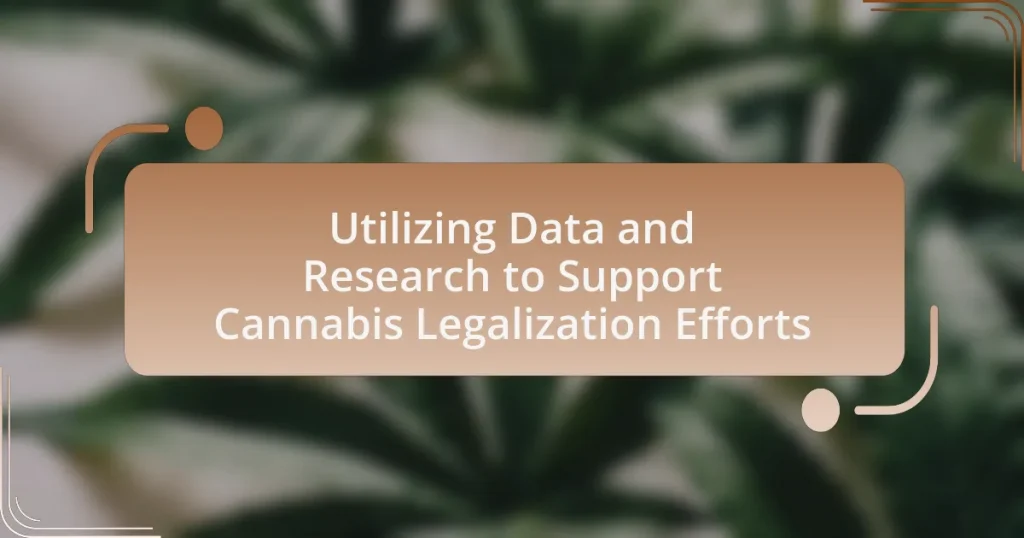The article focuses on the critical role of data and research in supporting cannabis legalization efforts. It highlights how empirical evidence influences public perception, shapes policy decisions, and addresses misconceptions about cannabis use. Key areas of research discussed include medical benefits, economic impacts, and public health outcomes, emphasizing the importance of reliable data in informing lawmakers and advocates. The article also outlines effective strategies for utilizing data in advocacy campaigns, ensuring credibility, and avoiding common pitfalls in data interpretation.

What is the role of data and research in cannabis legalization efforts?
Data and research play a critical role in cannabis legalization efforts by providing evidence-based insights that inform policy decisions. Comprehensive studies, such as those conducted by the National Academies of Sciences, Engineering, and Medicine, have demonstrated the potential benefits and risks associated with cannabis use, influencing public opinion and legislative action. For instance, research has shown that legalization can lead to increased tax revenue and reduced criminal justice costs, which are compelling arguments for lawmakers. Additionally, data on public health outcomes, such as the impact of cannabis on opioid use, further supports the case for legalization by highlighting potential societal benefits.
How can data influence public perception of cannabis legalization?
Data can significantly influence public perception of cannabis legalization by providing evidence-based insights into its effects on health, crime rates, and economic benefits. For instance, studies have shown that states which legalized cannabis experienced a reduction in opioid-related deaths, indicating potential health benefits. Additionally, data from the Colorado Department of Revenue reported over $1.5 billion in cannabis sales in 2020, highlighting substantial economic gains and tax revenue that can be reinvested in public services. Furthermore, surveys conducted by organizations like the Pew Research Center reveal that public support for legalization has increased from 32% in 2000 to 60% in 2019, correlating with the availability of data demonstrating positive outcomes from legalization in various states. This evidence helps to shift public opinion by countering misconceptions and showcasing the tangible benefits of cannabis legalization.
What types of data are most effective in shaping public opinion?
Quantitative data, such as statistics on cannabis use and its effects, is most effective in shaping public opinion. For instance, surveys indicating that a majority of the population supports cannabis legalization can significantly influence perceptions. Research from the Pew Research Center shows that as of 2021, 60% of Americans support legalizing cannabis, reflecting a shift in public sentiment. Additionally, health-related data demonstrating the medical benefits of cannabis, such as its efficacy in treating chronic pain or epilepsy, can further sway opinions. Studies published in journals like the Journal of Pain Research provide empirical evidence that supports these claims, reinforcing the argument for legalization.
How does research address common misconceptions about cannabis?
Research addresses common misconceptions about cannabis by providing empirical evidence that challenges outdated beliefs. For instance, studies have shown that cannabis does not lead to a significant increase in violent crime, contradicting the misconception that legalization would result in higher crime rates. A report by the National Academy of Sciences in 2017 found no causal link between cannabis legalization and increased crime, indicating that fears surrounding public safety are unfounded. Additionally, research has demonstrated the medical benefits of cannabis, such as its efficacy in treating chronic pain and reducing seizures in epilepsy patients, which counters the belief that cannabis has no therapeutic value. The 2018 report from the National Academies of Sciences, Engineering, and Medicine highlighted these medical benefits, reinforcing the argument for legalization based on health outcomes.
Why is empirical research important for policymakers?
Empirical research is crucial for policymakers because it provides evidence-based insights that inform decision-making processes. By utilizing data derived from systematic observation and experimentation, policymakers can assess the potential impacts of cannabis legalization on public health, crime rates, and economic factors. For instance, studies such as “The Effects of Cannabis Legalization on Crime Rates” published in the Journal of Drug Policy Analysis demonstrate that legalization can lead to a decrease in certain types of crime, thereby guiding policymakers in crafting effective legislation. This reliance on empirical evidence ensures that policies are grounded in reality rather than assumptions, ultimately leading to more effective governance.
What specific data points do policymakers rely on for decision-making?
Policymakers rely on specific data points such as public health statistics, economic impact assessments, crime rates, and social equity metrics for decision-making regarding cannabis legalization. Public health statistics provide insights into the effects of cannabis use on health outcomes, while economic impact assessments evaluate potential tax revenues and job creation associated with legalization. Crime rates inform policymakers about the effects of legalization on law enforcement and public safety. Social equity metrics assess the impact of cannabis policies on marginalized communities, ensuring that legalization efforts promote fairness and justice. These data points are essential for creating informed, evidence-based policies that address the complexities of cannabis legalization.
How can research findings impact legislative processes?
Research findings can significantly impact legislative processes by providing evidence-based data that informs policymakers’ decisions. For instance, studies demonstrating the economic benefits of cannabis legalization, such as increased tax revenue and job creation, can persuade legislators to support legalization efforts. A notable example is the 2018 report by the Colorado Department of Revenue, which indicated that cannabis sales generated over $1.5 billion in tax revenue since legalization, influencing other states to consider similar legislation. Additionally, research on public health outcomes, such as the reduction in opioid prescriptions in states with legalized cannabis, can shape legislative discussions around drug policy reform. These findings create a foundation for informed debate and can lead to the adoption of laws that reflect the latest scientific understanding and societal needs.

What are the key areas of research supporting cannabis legalization?
Key areas of research supporting cannabis legalization include medical benefits, economic impact, social justice, and public health. Medical studies have shown that cannabis can effectively treat chronic pain, epilepsy, and multiple sclerosis, as evidenced by research published in the Journal of the American Medical Association, which found that cannabis use significantly reduced chronic pain in patients. Economic research indicates that legalization can generate substantial tax revenue and create jobs; for instance, a report from New Frontier Data estimated that the legal cannabis industry could create over 1 million jobs by 2025. Social justice research highlights the disproportionate impact of cannabis prohibition on marginalized communities, with studies revealing that Black individuals are more likely to be arrested for cannabis-related offenses despite similar usage rates compared to white individuals. Lastly, public health research suggests that legalization can lead to safer consumption practices and reduce opioid use, as indicated by a study in the American Journal of Public Health that found states with legal cannabis saw a 25% reduction in opioid overdose deaths.
How does cannabis legalization affect public health outcomes?
Cannabis legalization generally leads to improved public health outcomes by reducing opioid-related deaths and increasing access to medical cannabis for patients. Research indicates that states with legalized cannabis have experienced a significant decrease in opioid prescriptions, which correlates with a reduction in opioid overdose deaths. A study published in the Journal of Health Economics found that states with medical cannabis laws saw a 25% reduction in opioid overdose mortality rates. Additionally, legalization allows for regulated access to cannabis, enabling patients to use it as an alternative treatment for various conditions, thus potentially decreasing reliance on more harmful substances.
What studies have been conducted on cannabis and mental health?
Numerous studies have been conducted on the relationship between cannabis and mental health, revealing both potential therapeutic benefits and risks. For instance, a systematic review published in the journal “Psychological Medicine” in 2019 by authors including Kevin P. Hill and others found that cannabis may alleviate symptoms of anxiety and post-traumatic stress disorder (PTSD) in some individuals. Conversely, research published in “The Lancet Psychiatry” in 2019 by authors such as Marta Di Forti indicated that high-potency cannabis use is associated with an increased risk of psychosis. Additionally, a study in “JAMA Psychiatry” in 2021 by authors including Michael T. Compton highlighted that while cannabis may provide short-term relief for certain mental health conditions, long-term use can lead to dependency and exacerbate mental health issues. These studies collectively underscore the complex interplay between cannabis use and mental health outcomes.
How does cannabis legalization impact substance abuse rates?
Cannabis legalization generally leads to a decrease in substance abuse rates, particularly concerning opioids and other illicit drugs. Research indicates that states with legalized cannabis have experienced a reduction in opioid prescriptions and related overdose deaths. For instance, a study published in the Journal of Health Economics found that states with medical cannabis laws saw a 25% reduction in opioid overdose deaths compared to states without such laws. Additionally, data from the National Institute on Drug Abuse suggests that cannabis legalization does not significantly increase the overall rates of substance use among adolescents, contradicting concerns about increased access leading to higher abuse rates.
What economic benefits are associated with cannabis legalization?
Cannabis legalization generates significant economic benefits, including increased tax revenue, job creation, and reduced law enforcement costs. For instance, states like Colorado have reported over $1.5 billion in tax revenue since legalization in 2014, demonstrating the financial impact of regulated cannabis markets. Additionally, the cannabis industry has created thousands of jobs; in Colorado alone, over 40,000 jobs were reported in the cannabis sector by 2020. Furthermore, legalization reduces law enforcement expenditures related to cannabis-related arrests, allowing funds to be redirected to other community services. These factors collectively illustrate the positive economic implications of cannabis legalization.
How does cannabis legalization affect job creation and tax revenue?
Cannabis legalization significantly boosts job creation and tax revenue. For instance, states that have legalized cannabis have seen substantial increases in employment opportunities within the cannabis industry, including cultivation, distribution, and retail sectors. According to a report by Leafly in 2021, the legal cannabis industry created over 320,000 jobs in the United States, reflecting a 32% increase from the previous year. Additionally, tax revenue from cannabis sales has proven to be a major financial benefit; Colorado, for example, collected over $387 million in tax revenue from cannabis sales in 2020 alone, which has been allocated to education, infrastructure, and public health programs. These statistics demonstrate that cannabis legalization not only generates jobs but also provides significant tax income for state governments.
What economic models predict the financial impact of legalization?
Economic models that predict the financial impact of legalization include the supply and demand model, the tax revenue model, and the cost-benefit analysis model. The supply and demand model assesses how legalization affects market prices and consumption levels, indicating potential increases in tax revenue and economic activity. The tax revenue model estimates the fiscal benefits from taxation on legalized products, projecting significant revenue increases based on data from states like Colorado, which generated over $1.7 billion in tax revenue from cannabis sales since legalization in 2014. The cost-benefit analysis model evaluates the economic advantages against potential social costs, providing a comprehensive view of the overall financial impact. These models collectively demonstrate the positive economic implications of legalization, supported by empirical data from various jurisdictions.

How can advocates effectively utilize data in their campaigns?
Advocates can effectively utilize data in their campaigns by leveraging statistical evidence and research findings to support their arguments for cannabis legalization. For instance, data showing the economic benefits of legalization, such as increased tax revenue and job creation, can be compelling; a report from the Marijuana Policy Group indicated that Colorado generated over $1.5 billion in tax revenue from cannabis sales in 2020. Additionally, advocates can use public health data to address concerns about cannabis use, demonstrating that regulated markets can lead to safer consumption practices and reduced black market activity. By presenting clear, data-driven narratives, advocates can enhance their credibility and persuade stakeholders to support legalization efforts.
What strategies can be employed to present data compellingly?
To present data compellingly, utilize visual aids such as charts and graphs, which enhance understanding and retention. Research indicates that visuals can improve information retention by up to 65% compared to text alone. Additionally, storytelling techniques can contextualize data, making it relatable and engaging for the audience. For instance, incorporating real-life case studies or testimonials can illustrate the impact of cannabis legalization, thereby making the data more persuasive. Furthermore, simplifying complex data into key takeaways ensures clarity and focus, allowing the audience to grasp essential points quickly.
How can visual data representations enhance understanding?
Visual data representations enhance understanding by simplifying complex information, making it more accessible and interpretable. For instance, charts and graphs can distill large datasets into visual formats that highlight trends and relationships, allowing viewers to grasp key insights quickly. Research indicates that people process visual information 60,000 times faster than text, which underscores the effectiveness of visual aids in communication. Additionally, studies show that visual representations can improve retention of information, as they engage both analytical and creative thinking, leading to a more comprehensive understanding of the subject matter.
What role do testimonials play alongside data in advocacy?
Testimonials serve as a powerful complement to data in advocacy by providing personal narratives that humanize statistics and research findings. While data offers objective evidence of trends and outcomes, testimonials add emotional weight and relatability, making the case for cannabis legalization more compelling. For instance, a study published in the Journal of Drug Policy Analysis highlights that personal stories can significantly influence public opinion and policymakers by illustrating the real-life impact of cannabis laws on individuals and communities. This combination of quantitative data and qualitative experiences enhances the overall persuasive power of advocacy efforts, making them more effective in driving change.
What are the best practices for gathering and presenting research?
The best practices for gathering and presenting research include using reliable sources, employing systematic methodologies, and ensuring clarity in presentation. Reliable sources such as peer-reviewed journals and government reports provide credible data, while systematic methodologies like randomized controlled trials or longitudinal studies enhance the validity of findings. Clarity in presentation involves using visual aids, concise language, and structured formats to make complex information accessible. For instance, a study published in the Journal of Cannabis Research highlights that clear visualizations significantly improve audience understanding of cannabis-related data.
How can advocates ensure the credibility of their data sources?
Advocates can ensure the credibility of their data sources by verifying the reliability and reputation of the organizations or individuals providing the data. This involves checking if the source is peer-reviewed, has a history of accuracy, and is recognized in the field of cannabis research. For instance, data from established institutions like the National Institute on Drug Abuse or peer-reviewed journals such as the Journal of Cannabis Research are generally considered credible due to their rigorous standards and expert oversight. Additionally, advocates should cross-reference data with multiple reputable sources to confirm consistency and accuracy, thereby strengthening the validity of their claims in supporting cannabis legalization efforts.
What common pitfalls should be avoided when using data in campaigns?
Common pitfalls to avoid when using data in campaigns include misinterpreting data, relying on outdated information, and failing to consider the context of the data. Misinterpretation can lead to incorrect conclusions, which may misguide campaign strategies; for instance, a study showing increased cannabis use among youth could be misrepresented to imply that legalization causes this trend, rather than considering other influencing factors. Relying on outdated information can result in strategies that do not reflect current public sentiment or legal landscapes, as seen in campaigns that used data from several years prior without accounting for recent changes in legislation or public opinion. Lastly, failing to consider the context can lead to cherry-picking data that supports a specific narrative while ignoring data that may contradict it, which undermines the credibility of the campaign.
What practical steps can advocates take to leverage data for cannabis legalization?
Advocates can leverage data for cannabis legalization by conducting comprehensive research to gather evidence on the benefits of legalization, such as economic growth, public health improvements, and criminal justice reform. For instance, a study by the National Bureau of Economic Research found that states with legalized cannabis experienced a decrease in opioid-related deaths, demonstrating a public health benefit. Additionally, advocates should utilize demographic data to identify and target key voter segments, ensuring that messaging resonates with specific communities. Furthermore, presenting data-driven case studies from states where cannabis is legal can effectively illustrate the positive outcomes of legalization, such as increased tax revenue and job creation, as seen in Colorado, which generated over $1.5 billion in tax revenue since legalization in 2014. By employing these strategies, advocates can create a compelling, data-backed narrative that supports cannabis legalization efforts.


